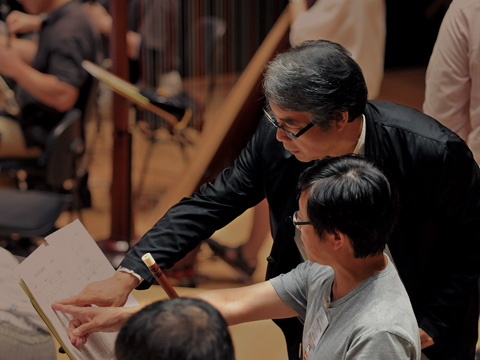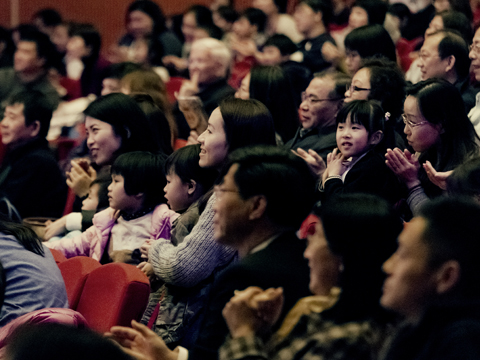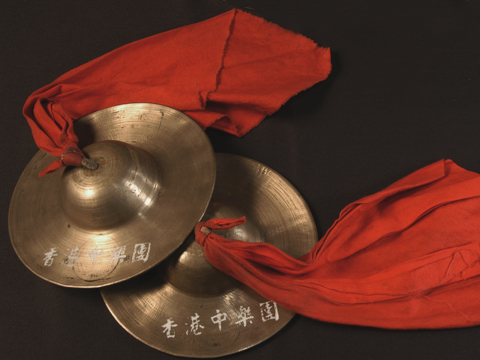
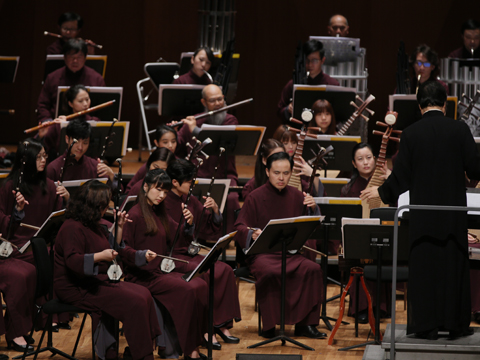
HKCO
Hong Kong Chinese Orchestra Environmental, Social and Governance Artistic Director and Principal Conductor for Life Orchestra Members Council Advisors & Artistic Advisors Council Members Management Team Vacancy Contact Us (Tel: 3185 1600)

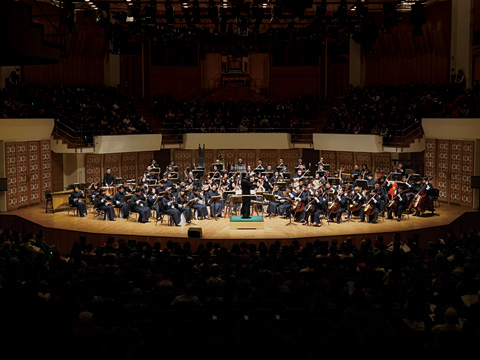
Concerts

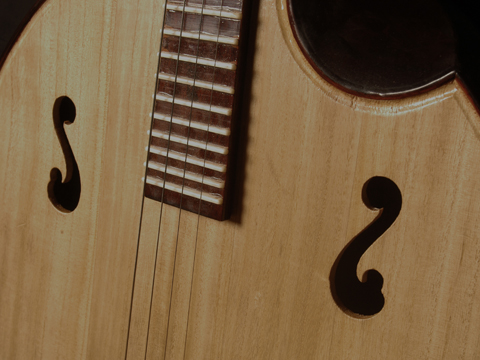
Education
The HKCO Orchestral Academy Hong Kong Youth Zheng Ensemble Hong Kong Young Chinese Orchestra Music Courses Chinese Music Conducting 賽馬會中國音樂教育及推廣計劃 Chinese Music Talent Training Scheme HKJC Chinese Music 360 The International Drum Graded Exam

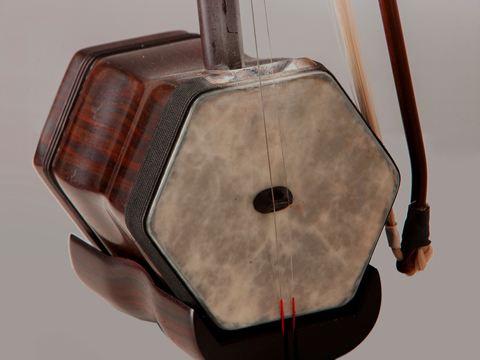
Instrument R&D
Eco-Huqins Chinese Instruments Standard Orchestra Instrument Range Chart and Page Format of the Full Score Configuration of the Orchestra
42nd Orchestral Season
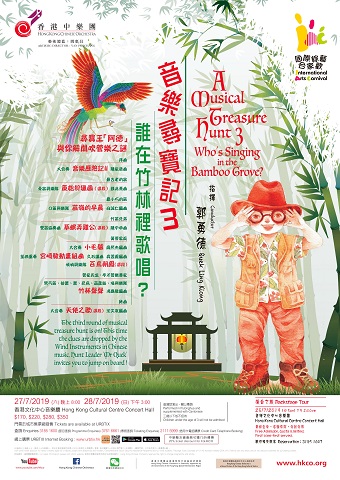
International Arts Carnival
A Musical Treasure Hunt III - Who’s Singing in the Bamboo Grove?
Chinese Music for the Family
8:00 pm
28/7/2019 (Sun)
3:00 pm
Duration: 1 hour without intermission
Children under age 3 will not be admitted
A Musical Adventure II (Excerpts) Tan Kah Yong
The oldest flute:
Gudi (bone flute) and Orchestra Primitive Safari (Excerpts) Qian Zhaoxi
Gudi (bone flute): Choo Boon Chong
The tiniest flute:
Koudi ('mouth flute' or small bamboo flute) and Orchestra Morning on Miao Mountains Bai Chengren Arr. by Lee Chung-chi
Koudi ('mouth flute' or small bamboo flute): Lin Yu-hsien
The Bamboo Flute Brothers
Double Di Concerto The Grasshopper Teasing the Cockerel (Excerpts) Chen Chung-Shen
Bangdi: Lin Yu-hsien
Qudi: Chan Chi Yuk
The reed-pipe family:
Guanzi and Orchestra Little Donkey (Excerpts) Arr. by Chew Hee Chiat
Guanzi: Qin Jitao
Sheng Quartet Suite from Miyazaki Hayao’s Animation Pictures (Excerpts) Joe Hisaishi Arr. by Wu Hsi-Feng
Double Suona and Orchestra Birds Paying Homage to the Phoenix (Excerpts) Arr. by Simon Kong Su Leong
Suona: Ma Wai Him, Law Hang Leung
Mr. Extraordinary - The Multi-talented Wind Expert
Winds and Orchestra Winds in the Bamboo Grove (Excerpts) Arr. by Phang Kok Jun
Xun (ocarina), Xiao (end-blown flute), Paixiao (pan pipe), Bawu (flute with reed), Hulusi (free reed instrument with a gourd wind chest), Dadi (a long transverse flute in the lower register), Xiaodi (small flute): Wu Chih-ting
Finale:
Song for Little Angels (Excerpts) Arr. by Sim Boon Yew
Curtain Call Piece:
A Musical Adventure II (Excerpts) Tan Kah Yong
Overture:
A Musical Adventure II (Excerpts) Tan Kah Yong
Written as the theme song for the Ministry of Education (MOE) Chinese Orchestra Music Camp 2009, A Musical Adventure depicts the composer's journey of music education. It begins with a 'magical' phase where
every musical note, chord, terms etc. that is introduced to the composer is a magical discovery to him. As the music lessons progressed into higher levels, the composer found them more and more difficult and challenging, very often having to endure hardship to be able to master the more complicated teachings
that were taught. Persistence and perseverance lead the composer out of the complications to attain a certain level of musical competency. The piece is deliberately ended with a minor 9th chord to give an incomplete feel, denoting that music education is a continuous and never ending process.
*The exotic instruments used in this piece: Hulusi (free reed instrument with a gourd wind chest), Bawu (flute with reed) (Lin Yu-hsien), Paixiao (pan pipe), Koudi ('mouth flute' or small bamboo flute), Xiaodi (small flute) (Wu Chih-ting), Xiao (end-blown flute) (Chan Chi Yuk), Xun (ocarina) (To Fung Lim)
The oldest flute:
Gudi (bone flute) and Orchestra Primitive Safari (Excerpts) Qian Zhaoxi
The music describes a hunting scene of the primitive – how they hunt in the quiet of the night, and how overjoyed they are when they have caught their prey. The leading instrument of the piece is areplica of the gudi, a seven-thousand-year-old instrument unearthed in Kemudu in Ningbo, Zhejiang. The music is an incorporation of the ancient ‘huowu’ mode, modern composition techniques and exotic rhythms and sounds.
*The exotic instruments used in this piece: Gudi (bone flute)(Choo Boon Chong), Xun (ocarina) (Wu Chih-ting, To Fung Lim)
The tiniest flute:
Koudi ('mouth flute' or small bamboo flute) and Orchestra Morning on Miao Mountains Arr. by Bai Chengren
The Miao’s are an ethnic minority group living in the area around Yunnan and Guizhou in southwestern China. Their music basically adopts the Chinese music system. The Miao people have many festivities, and singing and dancing are a way of life. One type of singing is ‘feige’, or ‘flying songs’, which refers to ‘the voices that soar’. The remote highlands where the tribes live are separated by the altitude and the rivers. Although the villages are visible to one another in a distance, it would take hours of walking on foot to visit, so the most effective way of communicating is by calling out and singing to each other. Such a geographical factor spawns a vocal genre that is typically bright in tone, robust in delivery, and so voluminous that it can carry far.
Morning on Miao Mountains is therefore a rendition of the melodic features of the ‘flying songs’, but has a high-stepping dance rhythm added to it. The music opens with a lilting ‘mountain song’, followed by a lyrical morning scene of birdsong. The middle section is lively and energetic, as it depicts the Miao people starting their busy day of work. The reappearance of the introduction in the coda section brings the song to a bird-chirping close.
*The exotic instrument used in this piece: Koudi ('mouth flute' or small bamboo flute) (Lin Yu-hsien)
The bamboo flute brothers:
Double Di Concerto The Grasshopper Teasing the Cockerel (Excerpts) Chen Chung-Shen
This is a piece of folk music depicting rural life in Taiwan, distinguished by its liveliness.
The composer blends the interesting features of rustic life with this age-old folk song by applying a variety of performing techniques to the double flutes to portray the persistent cockerel and the skippy grasshopper. The teasing between the two builds up in intensity but never falls into animosity. It is a very interesting double di concerto as it evokes a lively scene.
This piece was commissioned by the Taiwan Cultural Association (the predecessor of the Ministry of Culture) in 1988.
* The exotic instrument used in this piece: Yamudi (mother-duck flute) (Ma Wai Him)
The reed-pipe family:
Guanzi and Orchestra Little Donkey (Excerpts) Arr. by Chew Hee Chiat
Little Donkey is a children’s ballad with widespread and enduring popularity. It is fondly remembered by many people as part of their childhood memories. With its simple melodic structure and lively beat, it has a natural, fluid flow and a remarkable childlike appeal.
Sheng Quartet Suite from Miyazaki Hayao’s Animation Pictures (Excerpts) Joe Hisaishi Arr. by Wu Hsi-Feng
The music opens with the soprano sheng which takes us into the animation world of Joe Hisaishi, with a melodic passage that is familiar to many. The adagio section showcases the seamless blending of the tenor sheng, alto sheng and bass sheng. It ends with the characteristically mellow notes of the alto and bass shengs that set off the bravura soprano sheng very well, and create a lively mood.
Double Suona and Orchestra Birds Paying Homage to the Phoenix (Excerpts) Arr. by Simon Kong Su Leong
According to Chinese legend, the phoenix was at first only a very plain-looking bird with ordinary feathers. But it had a meritorious trait, and that was, it was very hard-working. It would work morning to night collecting fruit seeds that the other birds had thrown away, and kept them in a mountain cave.
Then one year, the forest was struck by a drought. Food was scarce, and the birds starved. The phoenix opened its cave and shared the dried fruits and seeds it had stockpiled over the years with the other birds. This helped the bird population to get through the difficult time.
After the drought, in order to thank the phoenix for saving their lives, the birds decided that they would each pick the most beautiful feather from their body and put them together to make the most beautiful coat as a gift for the phoenix. They also elected it to be the leader of all the birds. On its birthday, the birds would gather from all places to celebrate it with their ‘King’. The occasion was described as “birds paying homage to the phoenix”.
The music is inspired by the folk music of Shandong, Henan, Hebei etc. Its ebullient melody and the harmonious chorus of birdsong vividly recreate a lively scene in nature. In performing this piece, musicians are encouraged to improvise. Some would mimic the rooster’s crow and the hen’s croak.
The present arrangement was based on Ren Tongxiang’s version, but is expanded with the legend of the bird population paying homage to the phoenix. The orchestration includes two suona in the lead and the orchestra playing in concerto. This adds interest to the coda and jubilation to the mood.
Mr. Extraordinary - The Multi-talented Wind Expert
Winds and Orchestra Winds in the Bamboo Grove (Excerpts) Arr. by Phang Kok Jun
This piece is a collection of familiar children’s songs as well as folk songs from the Asian region.
Instead of the commonly played bamboo flutes such as the bangdi and qudi, the soloist will play on various lesser-seen flutes, such as the bawu, xun, hulusi etc., exploring their exotic tone colours in familiar tunes.
*The exotic instruments used in this piece: Xun (ocarina), Xiao (end-blown flute), Paixiao (pan pipe), Bawu (flute with reed), Hulusi (free reed instrument with a gourd wind chest), Xiaodi (small flute) (Wu Chih-ting)
Finale:
Song for Little Angels (Excerpts) Arr. by Sim Boon Yew
The music is a song cycle made up of nursery rhymes familiar to kindergarten children. It includes Yankee Doodle, Mary had a Little Lamb, How Much is That Doggie in the Window, Twinkle Twinkle Little Star, My Bonnie Lies over the Ocean, London Bridge is Falling Down, Red River Valley and She'll be Coming Round the Mountain.
Through these performances, children can understand the basics such as duple time, triple time and quadruple time in the structure of a piece of music. Despite its categorization as a children’s song, the present arrangement is far from being plain and simple.
Date&Time:
27/7/2019 (Sat) 7pm
28/7/2019 (Sun) 2pm
Venue: Hong Kong Cultural Centre Concert Hall
Free Admission. Quota is limited. First come first served.
Reservation:3185 1647
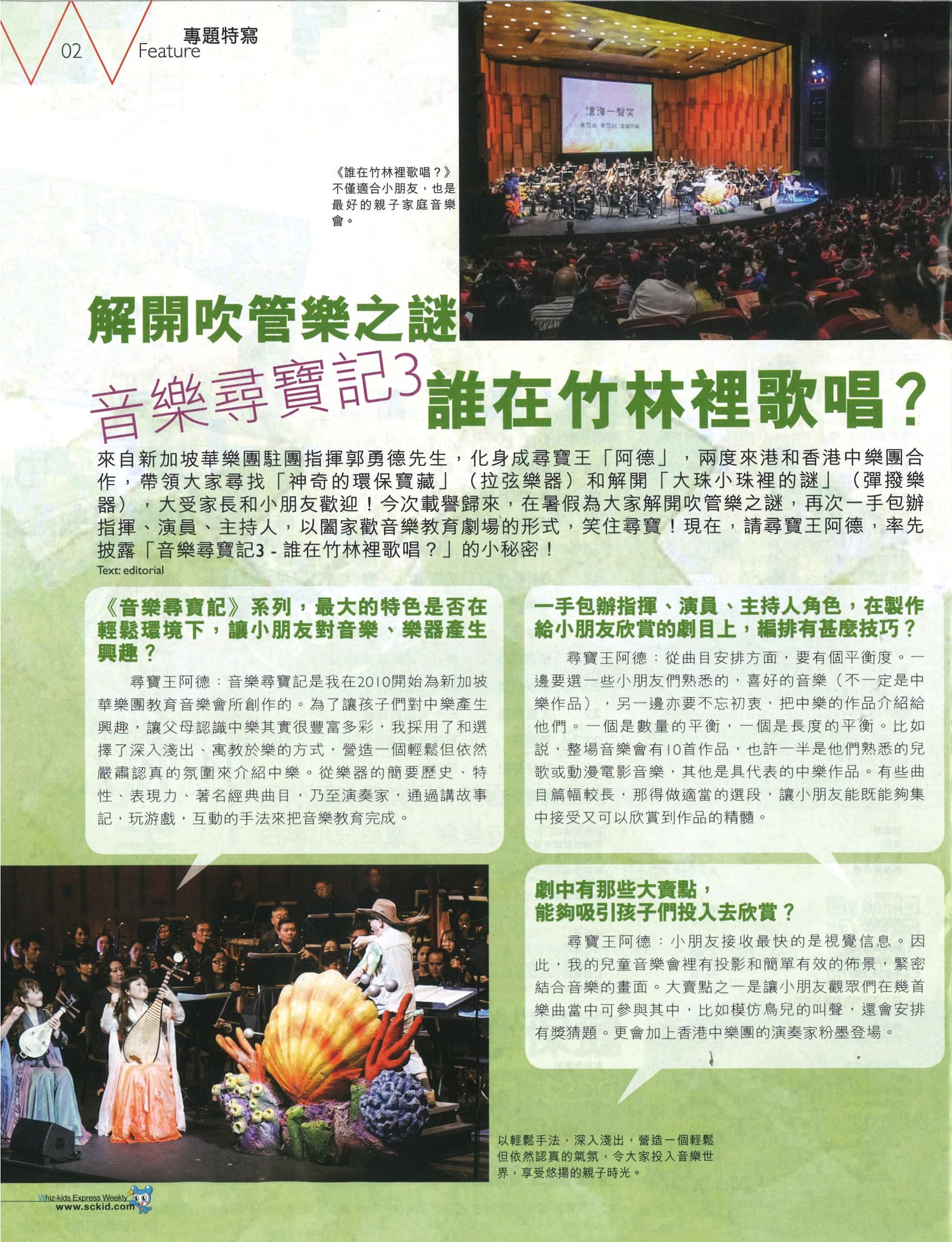
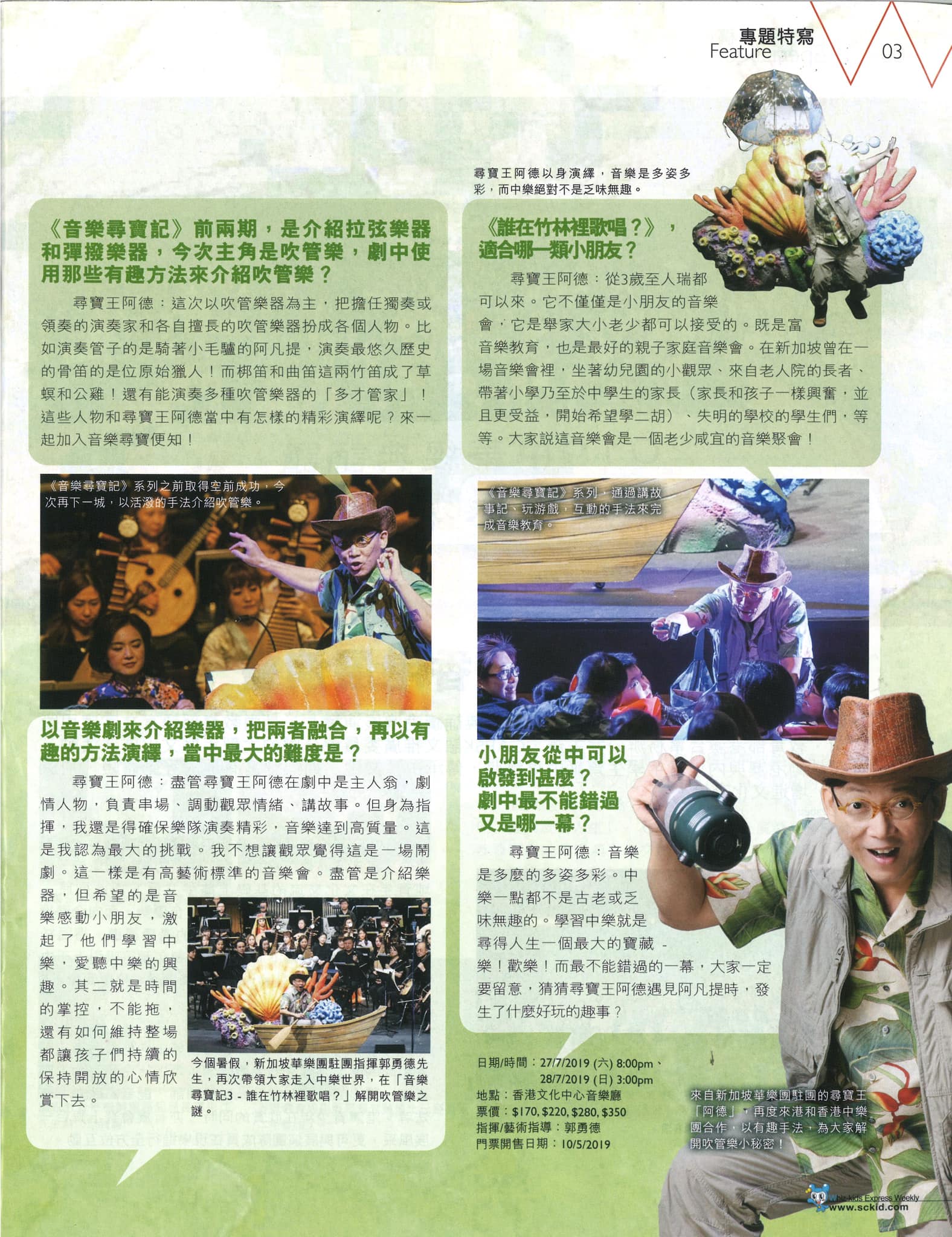
- SABATINI RISTORANTE ITALIANO
- SHIKIGIKU JAPANESE RESTAURANT
15% discount on dinner a la carte menu
- THE ROYAL GARDEN CHINESE RESTAURANT
- Dong Lai Shun Beijing and Huaiyang cuisine
- Le Soleil Vietnamese Cuisine
- THE GREENERY International Cuisine
30% discount on lunch buffet (Sun)
30% discount on dinner buffet (Mon-Sun), each guest may enjoy a complimentary glass of soft drinks or orange juice
- J'S BAR BISTRO
*The Royal Garden reserved the right to change the condition on discount offers.
Inquiries: 2721 5215
Your Support
Friends of HKCO
Copyright © 2025 HKCO
